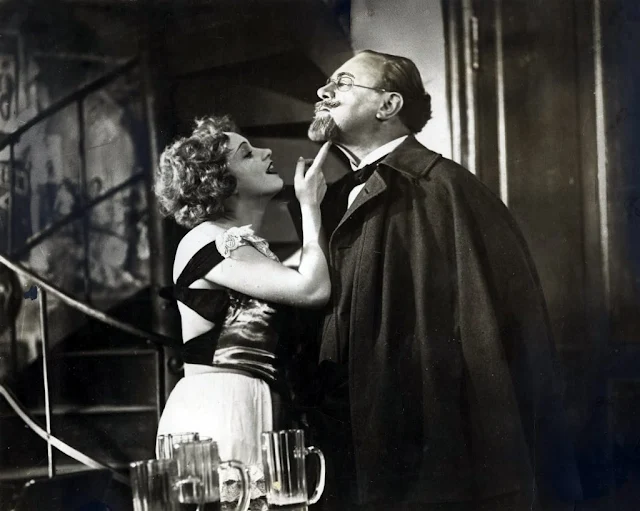 |
| Marlene Dietrich in Dishonored |
Cast: Marlene Dietrich, Victor McLaglen, Warner Oland, Gustav von Seyffertitz, Lew Cody, Barry Norton. Screenplay: Josef von Sternberg, Daniel Nathan Rubin. Cinematography: Lee Garmes. Art direction: Hans Dreier. Costume design: Travis Banton. Film editing: Josef von Sternberg. Music: Karl Hajos, Herman Hand.
Of the seven films Josef von Sternberg made with Marlene Dietrich, Dishonored is probably the weakest. Dietrich is not to blame: Photographed by Lee Garmes and dressed by Travis Banton, she looks as good as she ever did, and the movie gives her a chance to show her talent for comedy for the first time, when she pretends to be a rather bumptious girl from the country. But the story concocted by Sternberg and co-scripted with Daniel Nathan Rubin, a not particularly distinguished playwright, lacks wit and tension. Sternberg's direction allows the pace of the film to go slack, and his decision to edit the film himself doesn't help: His lap dissolves, for example, linger too long on the old scene as the new one fades in, causing visual confusion. Moreover, Dishonored features Victor McLaglen, of all actors, as the romantic lead. McLaglen was skilled as a heavy or a clumsy goof, and John Ford directed him to an Oscar for The Informer (1935), but he's out of place as the Russian spy who gets entangled with Dietrich's Austrian spy. For some reason, he spends a lot of the film flashing a rictus-like grin. Sternberg's story is based on the career of Mata Hari, about whom MGM made a competing movie starring Greta Garbo and Ramon Novarro the same year. Dietrich plays a war widow who has turned prostitute to survive, and is recruited for the Austrian Secret Service by its chief (Gustav von Seyffertitz) when she proclaims, "I've had an inglorious life. It may become my good fortune to have a glorious death." Through her career as Agent X-27 she is accompanied by a cat who is so faithful -- she even carries it in the open cockpit of an airplane -- that it suggests a witch's familiar. She's also a pianist, who encodes secrets in musical notation. (Not that she's a good pianist: At one point she plays the usually quietly serene opening of Beethoven's "Moonlight" sonata as if it were the "Appassionata.") Dishonored is no sillier than most of the Sternberg-Dietrich movies, but it doesn't wear its silliness with style the way the best of them do.












